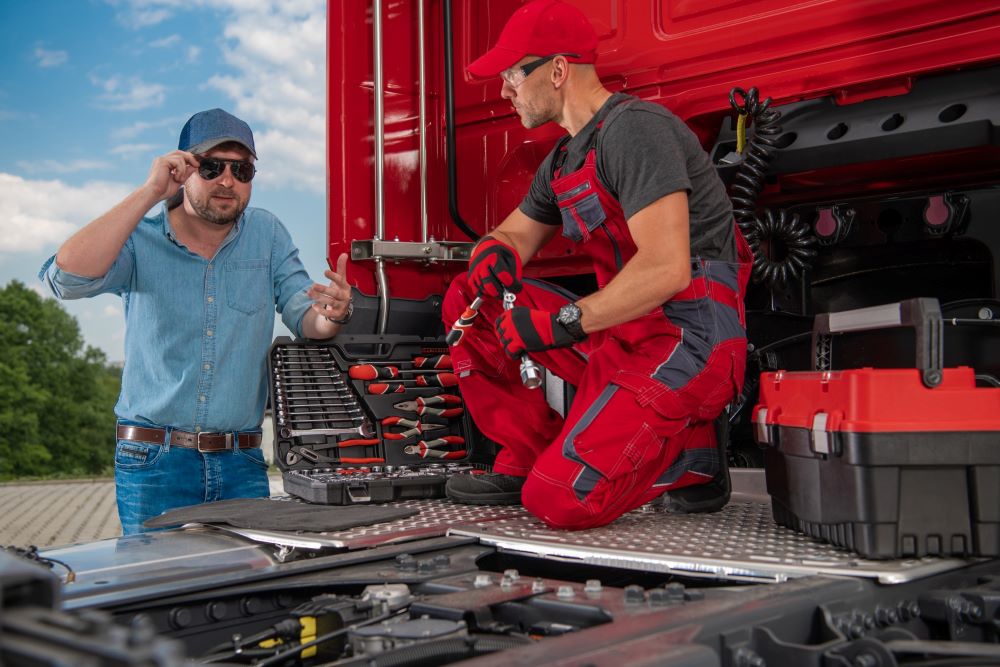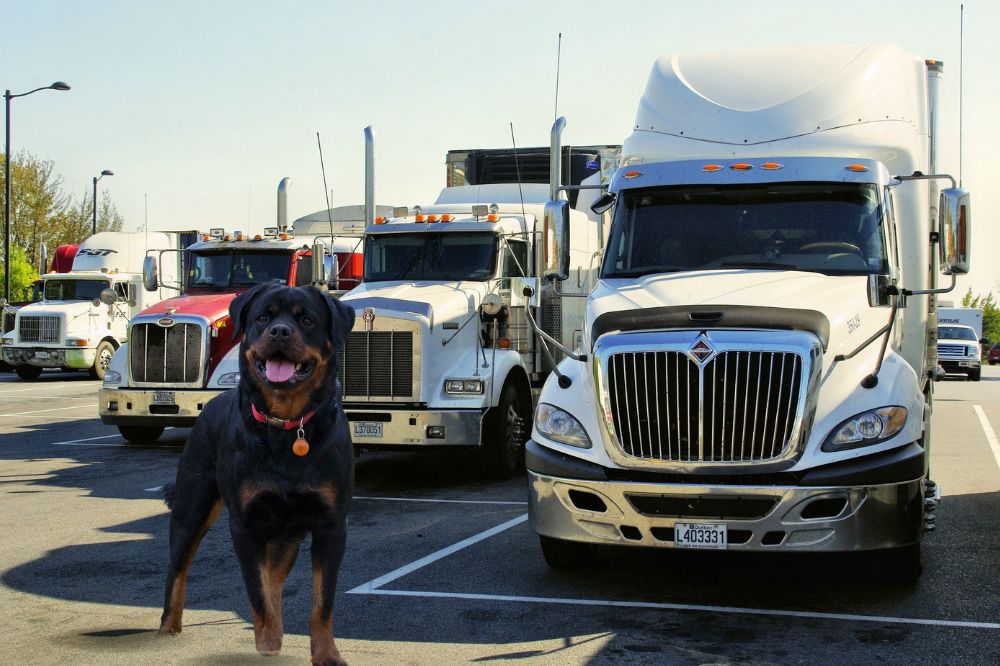If you’re looking for accessories to improve your semi-truck, then a dash cam should be high up the list.
A good dash cam system can be invaluable for truck owners, giving you crucial video footage when you need it. These cameras can also include a range of different features to help you drive more safely. Plus, dash cams can reduce the cost of accidents by 86%.
Let’s explore everything you need to know about finding the right semi-truck dash cam and why a dash cam can be so valuable.
What Are Dash Cams?
Dash cams are small cameras mounted on a vehicle’s dashboard or windshield that record video footage while driving.
A dash cam system captures the road ahead and what’s going on in front of the truck. They can also record the driver and interior of the vehicle.
Car dash cams usually start recording automatically when the car is in motion and store footage on a micro SD card or through cloud storage. Some of the best dash cam systems offer features like GPS tracking, night vision, and motion detection.
Whether you’re a truck driver, a fleet manager, or an owner-operator, using a semi-truck dash cam can offer a lot of benefits. Dash cameras are also really easy to install and use, so there’s no excuse not to install a dash camera in your truck.
Why Truck Drivers Need Dash Cams
So, why is dash cam footage so useful? Here are some of the main benefits of dash camera recorded footage for commercial vehicles.
Safety and Security
Dash cams provide critical evidence in case of accidents. They help to clarify fault and protect drivers in cases that result from accidents.
A front-facing camera also protects you against false claims and fraud by recording unbiased footage of events on the road.

Insurance Savings
Using a dash cam can lead to potential discounts on insurance premiums, as insurers see them as risk-reducing devices.
They also simplify the claims process by providing clear, indisputable video evidence.
Monitoring and Compliance
A dash cam can help ensure drivers comply with road safety regulations by recording their actions. They can clearly monitor driver behavior, which helps to prevent risky driving practices.
Theft Prevention
A dash cam can act as a deterrent against cargo theft by continuously recording activity around the truck.
And if there is a break-in, the video footage provides valuable evidence to help you identify culprits and recover stolen goods.
Best Types of Dash Cam Systems
When choosing the best dash cam for your vehicle, it’s important to understand the different camera types and configurations available.
Front-Facing Dash Cams
Front-facing dash cams monitor the road ahead.
You mount these cams on the windshield or dashboard and continuously record the front view of the road. They’re ideal for capturing traffic incidents and documenting road conditions like weather, traffic flow, and road hazards.
If you’re looking for a dash cam to help monitor traffic violations or provide evidence to your insurance company, then this is the best type.
Dual-Facing Dash Cams
Dual-facing dash cams record both the road ahead and the interior of the vehicle.
These systems have two cameras: one facing forward and one facing the driver. This setup is particularly useful for fleet managers and trucking companies wanting to monitor driver behavior and ensure they’re keeping compliant with safe driving practices.
If you want complete insight into your fleet vehicles, want to improve driver behavior or keep driver scorecards, then this is the type of camera you’ll want.

Image credit Amazon
Rear-View Dash Cams
Companies install rear-view dash cams at the back of the truck to capture footage from behind. They’re essential for documenting rear-end collisions and any incidents involving cargo – like theft or damage during trucking operations.
Rear-view dash cams provide valuable evidence where another vehicle collides with the truck from behind or when cargo is tampered with. You can also use a rear-view semi-truck dash cam to help with reversing, parking, and reducing blind spots.
360-Degree Dash Cams
If you’re after the most comprehensive semi-truck dash cam system, then you’ll want a 360-degree setup. As you can guess, these record around the entire vehicle.
360-degree systems use multiple cameras or a single camera with a wide-angle lens to cover all angles, including front, rear, and sides. They’re ideal for improving situational awareness and safety, especially in reducing blind spots.
This type of dash cam is beneficial in complex driving environments, like urban areas or tight parking spaces, where there are a lot of surrounding hazards. They also provide critical footage around the truck for security against cargo theft.
Factors to Consider When Choosing the Best Dash Cams for Trucks
While dash cameras may seem straightforward, there’s a lot to consider when choosing a dash cam – especially if you need to kit out a large fleet.
Here are some of the key things to keep in mind.
Video Quality
HD video footage is important for dash cams because it ensures clarity and detail in the recorded video. You’ll want this if you’re reviewing incidents and gathering evidence.
We recommend using a dash cam with at least 1080p resolution to capture clear and detailed images of the road, license plates, and other crucial details.
Night vision capabilities are also important for low-light conditions. This means you can record clear footage at night or in poorly lit environments.

Storage Capacity
Having enough storage capacity is vital for dash cams – especially if you’re using them for long trips.
Dash cams should have sufficient built-in memory or support for high-capacity memory cards, such as microSD cards up to 128GB or more. This allows for extended recording time without the need to delete or overwrite old footage.
Expandable memory options are best, as they give you more flexibility to increase storage capacity if you need it. Some dash cams also offer loop recording, which automatically overwrites the oldest footage when the storage is full.
Durability
Durability is a key factor for dash cams used in trucks, as they need to withstand harsh conditions and constant use. They also need to hold up against accidents.
Try to get a dash camera with weather-resistant construction. This ensures it can operate reliably in various climates, from extreme heat to freezing cold (important for ice road driving).
Look for dash cams with rugged housing that protects them from dust, moisture, and direct sunlight. Vibration and impact resistance are also important for long-term reliability – especially given the vibrations and shocks you’ll experience during long-haul driving.
GPS and Speed Tracking
A dash camera with GPS integration can also provide valuable location tracking. These cams can record things like the vehicle’s route, speed, and position.
This feature is particularly useful for fleet management, as it helps monitor the truck’s movements and ensures that your drivers follow their planned routes. You can use GPS data to verify the location and time of incidents, adding an extra layer of evidence.
Dash cams that record speed data alongside video footage can be incredibly useful in monitoring reckless driving and supporting compliance and safety initiatives.

Ease of Use and Installation
Dash cams should be easy to use, with simple interfaces and controls. This is important, as you may need to operate them while driving.
Look for models with intuitive menus, clear displays, and simple button layouts that make it easy to navigate settings and review footage. A straightforward installation process is also important.
Many dash cams come with mounting hardware and step-by-step instructions that do not require professional installation. Features like adjustable mounts, adhesive pads, or suction cups can make the installation process a lot easier.
Connectivity and Additional Features
Some dash cams include connectivity options, such as Wi-Fi or Bluetooth. This makes it easier to transfer data to other devices with no need to remove the memory card.
Advanced features like collision detection, parking mode, and live streaming are also worth looking into.
Collision detection uses sensors to save footage automatically when it detects an impact. This ensures critical moments are preserved. Parking mode records activity around the truck when it’s parked to help protect the vehicle against theft.
Live streaming features let you access real-time footage from the dash cam feed. This is useful for fleet managers monitoring vehicles remotely.
Conclusion
The right dash cam can be useful for protecting your truck, helping with insurance claims, improving driving habits, and enhancing driver safety. Whether you’re an independent driver wanting to protect yourself, or a truck owner or fleet manager, using a dash cam is always beneficial.
These cameras are also really simple to install and use, but when you need them, they’ll offer you a massive advantage, making them well worth the investment.
Are you looking to purchase a new semi-truck? Then you’ll need to start by finding the right financing solution. We make this easy at Mission Financial Services, helping all truck drivers access the financing they deserve. Get started to see how easy it can be to purchase a commercial vehicle.

























